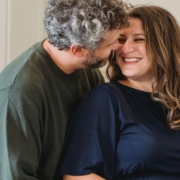What Are Some Communication Exercises for Couples?
When it comes to relationship communication exercises, it’s important to take your partner’s perspective into consideration. But mending your relationship shouldn’t focus solely on couples therapy communication questions. You should also look at different activities and exercises you can do together to strengthen your bond. So, what activities can couples do to strengthen their relationship? Let’s take a look at some top examples in this blog.
What Are Some Communication Exercises Couples Can Do Together?
It’s no secret, communication is an important element of a healthy, strong relationship. Unfortunately, communication problems are a common issue between partners, and it can be hard to know what’s causing them. These problems often lead to conflict and even resentment between partners. Thankfully, there are several activities couples can do together to strengthen how they communicate. You and your partner can use these couples’ communication games and exercises to improve your ability to listen, communicate clearly, and deepen your emotional connection with one another.
- Actively listening without interruption so you can better understand your partner and their perspectives. Giving them space to speak freely while you listen to their needs, concerns, or potential solutions to issues is important. Understanding how they feel and how you can help them will deepen your connection and encourage empathy.
- Use “I” statements to clearly explain your feelings without blaming the other person. For example, saying “I feel sad and lonely when you’re gone all day because I think it means you don’t want to be around me” rather than “You’re never home!” This “I” statement points out how you feel and doesn’t condemn your partner for what you think they did wrong.
- Express gratitude when you appreciate something your partner has done, no matter how small. Simply saying “Thank you for making coffee this morning” or “I appreciate that you cooked dinner” goes a long way in making your partner feel loved and recognized.
- Daily or weekly check-ins to help reconnect with your partner when life gets busy. It’s important to set aside time specifically for you and your partner to share how you’re feeling and what’s going on in your life.
- Keep a joint journal where you take turns writing notes to each other. This can help you openly express your feelings and gratitude, follow a joint prompt, or even write a gushy love letter. Giving yourself a safe space to share with your partner will help deepen your connection.
- Use the “Sandwich Method” to clearly request your partner to help with something without being demanding. You “sandwich” your requests or concerns between two positive statements to help show your appreciation, while also encouraging your partner to help. For example, “Thank you for cooking dinner last night. Would you be able to take care of the dishes as well? I know you do so much around the house already, but it would be really helpful.”
- Get crafty and work together on making something creative and fun. Whether you take an art and wine class or do a photoshoot, you can connect and be active with your partner in exciting new ways.
There are several more relationship exercises for couples communication that you can do to strengthen the connection between you and your spouse. Ultimately, it comes down to dedicating time and effort to your partner.
If you’re struggling to connect with your partner, consider couples therapy. Going through therapy together doesn’t mean you’ve failed as a couple, but rather you’ll gain the tools you need to address relationship problems head-on. This approach includes learning how to communicate effectively about core issues you’re facing together. If you’re interested in taking steps toward strengthening your marriage, the licensed therapists at Well Marriage Center are here to help.
5 Examples of Communication Exercises
1. Mirror & Switch. Periodically “checking in” where one partner starts with a series of statements about the relationship. Their partner mirrors back their answer to them, to show they understand and hear the statement. This focuses on hearing each other instead of responding to each other. The mirroring is a brain exercise. If I’m mirroring you, I must remember what you’re sharing. It greatly assists in reducing reactivity, eliminates arguments, and shows their partner they are heard.
Example:
“Something I appreciate about you is…(your kindness to others.)”
Partner mirrors… “You appreciate…(that I’m kind to other people)”
“Where I am in our relationship is…”
Partner mirrors, “Where you are in our relationship is…”
“What I’d like to work on today is…”
Partner mirrors, “today you’d like to work on…”
Then they would switch and the other would fill in their answers.
2. Dialogue vs. Debate. Couples try to reframe things as dialogue instead of as a debate. You want to listen, understand your goal, ask questions, and accept each other’s experiences. It can be helpful to write out your point before bringing it to your partner. Write out your initial point, then try to reword and reframe your point until it fits more into the “dialogue” category.
Differences:
Dialogue
- Goal = understanding (the relationship wins)
- Listening = happens before talking
- Concentrate on the other person, validate them, and see them as strong
Debate
- Goal = winning (usually both of you lose)
- Not Listening = counter what they say and ask questions to trip them up
- Concentrate on making points, criticizing them, and see them as weak
3. “I Statements”. One of the most basic communication skills to use in problem-solving and goes along well with the mirroring exercise. “I Statements” are primarily about “me” and only secondarily about “you” with no blame on the other person.
Example:
“I feel _______ When _______ Because _______ and sometimes include “what I want/need”
I feel sad when you pull away from me because I want to be closer to you
I feel frustrated when you tell me to do _______, I want trusted to start it myself
4. Reflective Listening. Focus on accurately hearing the other person and then saying it back so they know you head them. Listen, validate, ask for what you want, search for win-win solutions where each gets something, and be present in the conversation. Something you could also try is to ask your partner to only listen to you and not say anything back for at least 24 hours to give more time for reflection.
Example:
“If I’m hearing you right, you’re feeling upset at me for not ‘believing’ … you want to feel trusted”
5. Basic Conflict Resolution (Problem- Solving) Strategies. There are a variety of other strategies to use to help you problem-solve.
Examples:
- Solution counter-solution technique – write down all suggested solutions till agreement is reached
- Change roles and argue the other person’s position – can build empathy and understanding
- Barter – this is often better than pure compromise and is a form of compromise
- Avoid starting with a negative/critical comment – stay away from blaming using the words always or never
- Be specific about what is bothering you – deal with one issue at a time and don’t bring up other issues
- Use a talking stick or another object while talking to help take turns
- Take breaks when needed and give time to return – possibly do an argument autopsy several days later
What Can Couples Do to Improve Communication?
The best way to improve communication between you and your partner is to find the root of the problem. Whether there’s a lack of trust or disagreements on significant issues like children or finances, poor communication is often an unfortunate byproduct. While you might be able to work through these concerns together, couples therapy may be able to help if you’re still experiencing issues.
One of the main advantages of therapy is having the ability to share your thoughts and emotions in a safe and supportive setting. There’s no need to worry about being judged in your sessions. The therapists at Well Marriage Center can guide you in understanding one another’s perspectives and goals. Couples can discover new communication techniques and couples’ communication questions in treatment, such as active listening skills and other helpful techniques. We also focus on strengths-based therapy, which highlights your successes as a couple rather than what you’re struggling with.
These techniques can improve your communication inside and outside of therapy sessions. If you would like to deepen your bond and strengthen your relationship, visit our website today or get in contact with our intake coordinator, Melinda. A brighter future of stronger communication awaits!












